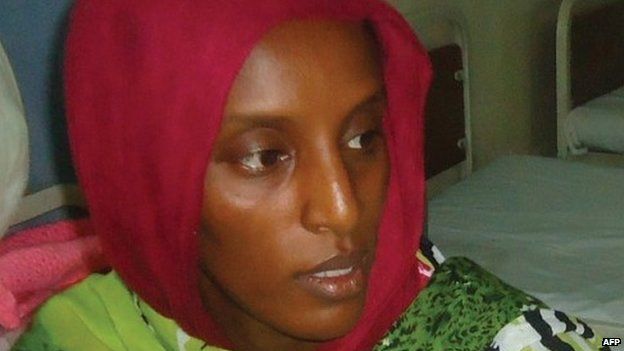Sudan death row case: US works for Meriam Ibrahim exit
- Published

The US says it is working with Sudan to ensure a woman freed from death row can leave the country, after she was detained at Khartoum airport.
Meriam Ibrahim's lawyer says she and her husband are being questioned over their travel documents. It is thought they were trying to fly to the US.
She was sentenced in May to hang for renouncing Islam - sparking an outcry - but was released from jail on Monday.
Mrs Ibrahim's husband is a Christian from South Sudan and is a US citizen.
Security agents detained Mrs Ibrahim, husband Daniel Wani and two children at the airport on Tuesday, her lawyer, Thabit Suliman, said.
"The security authorities have not stated why she was apprehended and they are still being held in a security building at the airport," the lawyer added.
Sudan's government has assured the US that Mrs Ibrahim and her family are safe
US State Department spokeswoman Marie Harf said Sudan's government had given assurances that Mrs Ibrahim and her family were safe.
Earlier, a top Sudanese official told the BBC that although Mrs Ibrahim is Sudanese, she was using emergency South Sudanese papers with a US visa.
She would be asked to get a passport and exit visa on her release, Abdullahi Alzareg from the ministry of foreign affairs said.
Analysis: James Copnall, former BBC Sudan correspondent
The National Intelligence and Security Service (NISS) is an extremely powerful body, which frequently intervenes in Sudanese politics.
It is a key part of the informal coalition - also comprising the military, Islamists and pragmatists - which rules Sudan.
The different components are constantly jockeying for a better position.
In recent times, NISS has been flexing its muscles.
It is very possible that NISS did not like the decision to release Meriam Ibrahim, and re-arresting her and her family was a way of making this point to the rest of the Sudanese government.
However, security is not a homogenous entity either.
It is also conceivable that one part of NISS accepted Mrs Ibrahim's release, while another section was not happy with it.
Mrs Ibrahim's release and re-arrest simply underline the fact that there are many decision-makers in Sudanese politics, and they do not always agree with each other.
Mrs Ibrahim was released from prison on Monday after an appeal court annulled the death sentence imposed on her.
She was initially arrested in February, and gave birth to a daughter in prison not long after being sentenced.
Before she was detained on Tuesday, Western countries had welcomed the decision to rescind the death penalty.
Born to a Muslim father, Mrs Ibrahim, 27, married Mr Wani in 2011.
Sudan has a majority Muslim population, and Islamic law has been in force there since the 1980s.
Even though Mrs Ibrahim was brought up as an Orthodox Christian, the authorities considered her to be a Muslim because that is the religion of her father.
- Published15 May 2014
- Published23 June 2014
- Published30 May 2014
- Published13 September 2023